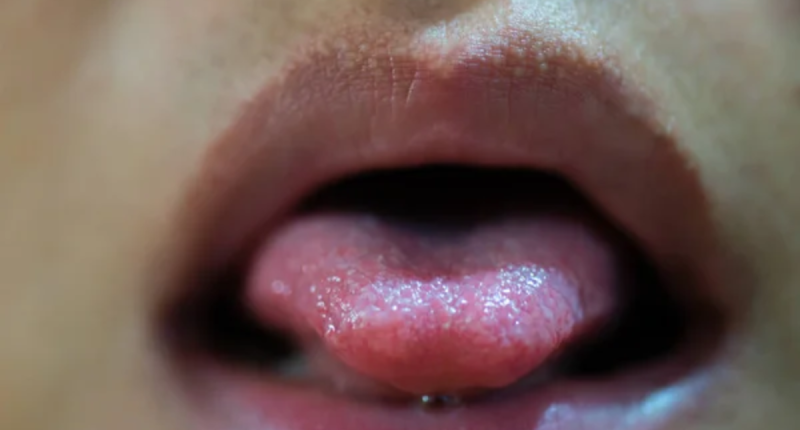A tongue ulcer is a small, shallow sore that develops on the tongue. These sores are typically oval or round in shape and have a white or yellowish center surrounded by a red border. Tongue ulcers can be painful and make eating, talking, and even swallowing uncomfortable.
Are Tongue Ulcers Contagious and Harmful?
Tongue ulcers are not contagious and not harmful. They are not caused by a virus or bacteria and cannot be spread from person to person or catch them from sharing utensils or engaging in close contact with someone who has them.
While tongue ulcers are not contagious nor harmful, they can be very painful and uncomfortable. Most tongue ulcers heal on their own within a week or two, but there are a number of things you can do to relieve the pain and discomfort which will be discussed as you read along.
Unveiling the Discomfort: Symptoms of Tongue Ulcers
Pain and Discomfort – The most prevalent symptom of tongue ulcers is pain. The ulcers, often small and round, can make activities like eating, drinking, and speaking uncomfortable. The level of pain can vary depending on the size and location of the ulcer.
Visible Sores – Tongue ulcers are usually visible to the naked eye. They appear as white or yellowish spots with a red border. The size can range from a few millimeters to larger, more substantial sores.
Changes in Texture – The affected area around the ulcer may undergo changes in texture. It might feel rough or slightly raised compared to the surrounding healthy tissue.
Increased Sensitivity – The presence of tongue ulcers often heightens sensitivity in the affected area. Temperature extremes, spicy foods, or acidic substances can exacerbate discomfort and cause a burning sensation.
Difficulty in Eating and Drinking – Due to the pain associated with tongue ulcers, individuals may experience difficulty in eating and drinking. This can lead to unintentional weight loss or nutritional deficiencies if the problem persists.
Irritation While Speaking – Speaking can become an irritant when tongue ulcers are present. The movement of the tongue against the teeth or the roof of the mouth may aggravate the sores, adding to the overall discomfort.
Swelling and Inflammation – In some cases, tongue ulcers may cause localized swelling and inflammation. This can further contribute to the overall sensitivity and discomfort experienced by the individual.
Recurrent Ulcers – For some individuals, tongue ulcers can become a recurrent issue. They may appear periodically, causing intermittent discomfort. Understanding the triggers for recurrence can aid in managing and preventing future outbreaks.
Enlarged Lymph Nodes – In certain instances, the body’s immune response to tongue ulcers may result in the enlargement of nearby lymph nodes. This is a natural reaction as the body works to combat the perceived threat.
Fever and Fatigue – While less common, severe cases of tongue ulcers may be accompanied by systemic symptoms such as fever and fatigue. These symptoms warrant prompt medical attention to rule out underlying health concerns.
Causes
The exact cause of tongue ulcers is unknown, but they are thought to be caused by a combination of factors. Some common causes include:
Minor injury to the mouth: This can be caused by accidentally biting the inside of your cheek or tongue, eating hard or acidic foods, or brushing your teeth too vigorously. These injuries can disrupt the delicate tissue of the tongue, making it more prone to ulcers.
Stress: Stress can trigger the development of tongue ulcers in some people. When you are stressed, your body releases hormones that can weaken your immune system and make you more susceptible to inflammation, including in the mouth.
Hormonal changes: Tongue ulcers are more common in women during their menstrual periods. This suggests that hormonal fluctuations may play a role in their development.
Food allergies or sensitivities: Some people may develop tongue ulcers after eating certain foods, such as citrus fruits, tomatoes, or chocolate. These foods may trigger an allergic reaction or sensitivity in some individuals, leading to inflammation and ulcer formation.
Vitamin deficiencies: Deficiencies in vitamin B12, iron, or zinc may also contribute to the development of tongue ulcers. These vitamins are essential for maintaining healthy tissues in the mouth, and a deficiency can make the tongue more vulnerable to ulcers.
Other medical conditions: Certain medical conditions, such as Crohn’s disease, Behcet’s syndrome, and HIV/AIDS, can also increase the risk of developing tongue ulcers. These conditions may cause systemic inflammation or affect the immune system, making the mouth more prone to ulcers.
Genetics: There is some evidence to suggest that tongue ulcers may have a genetic component. People with a family history of tongue ulcers may be more likely to develop them themselves.
Irritants: Certain irritants, such as sodium lauryl sulfate (SLS), a common ingredient in toothpastes and mouthwashes, can trigger tongue ulcers in some people. SLS can irritate the delicate tissues of the mouth, making them more prone to ulceration.
Additionally, in individuals with autoimmune conditions, the immune system may launch an attack on the oral mucosa, the lining of the mouth. This attack can result in the formation of ulcers on the tongue. While not all autoimmune conditions directly lead to tongue ulcers, certain ones, like Behcet’s disease or systemic lupus erythematosus (SLE), are known to have oral manifestations, including the appearance of ulcers.
Treatment for Tongue Ulcers
There is no cure for tongue ulcers, but there are treatments that can help to relieve the pain and speed up the healing process. Over-the-counter pain relievers, such as ibuprofen or acetaminophen, can help to reduce pain. Topical treatments, such as gels or rinses that contain lidocaine or benzocaine, can also help to numb the pain. In some cases, your doctor may prescribe a stronger medication to help relieve the pain.
Most tongue ulcers heal on their own within one to two weeks. However, if you have a tongue ulcer that lasts for more than two weeks, is very large or painful, or is accompanied by other symptoms, such as fever or weight loss, see your doctor.
Prevention of Tongue Ulcers
There is no way to completely prevent tongue ulcers, but there are things you can do to reduce your risk of developing them. These include:
Avoiding biting the inside of your cheek or tongue
Eating a healthy diet that is low in acidic foods
Managing stress
Getting enough sleep
Maintaining good oral hygiene by brushing and flossing your teeth regularly
Using a soft-bristled toothbrush and non-abrasive toothpaste
Avoiding using mouthwashes that contain alcohol
If you have a history of tongue ulcers, it is a good idea to see your dentist regularly for checkups and cleanings. This can help to identify and treat any potential problems that could lead to the development of tongue ulcers.
When to See a Doctor
Most tongue ulcers heal on their own within one to two weeks. However, if your tongue ulcer is particularly large or painful, or if it does not heal within two weeks, see your doctor or dentist. They can rule out any underlying medical conditions and recommend appropriate treatment options.
Frequently Asked Questions
- Can I catch tongue ulcers from someone else? No, tongue ulcers are not contagious and cannot be transmitted from person to person.
- Do tongue ulcers always require medical attention? Most tongue ulcers heal on their own, but if you notice severe symptoms, it’s advisable to seek medical advice.
- What foods should I avoid to prevent tongue ulcers? While triggers vary from person to person, avoiding spicy and acidic foods can help prevent tongue ulcers for some individuals.
- Are there any home remedies for relieving the pain of tongue ulcers? Yes, applying a mixture of baking soda and water or using a soothing mouthwash can help alleviate the pain associated with tongue ulcers.
- How long do tongue ulcers typically last? The duration varies, but most tongue ulcers heal within one to two weeks. If they persist longer, consulting a healthcare professional is advisable.









